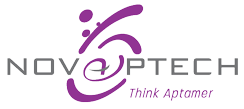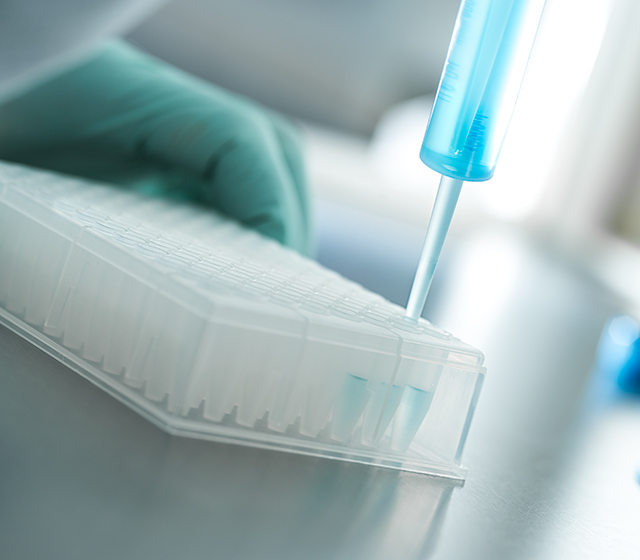Specialized oligos
Oligo Aptamers
Expert oligonucleotides manufacturer since 1987, Eurogentec collaborates with Novaptech,
Dr. Jean-Jacques Toulmé’s company, one of the world leaders in the development of oligonucleotide aptamers
Eurogentec and Novaptech
join their expertises
Together we provide high-value aptamer-related services which include the selection and production of custom optimized RNA and DNA aptamers for analytical, diagnostic and therapeutic applications. Each aptamer can be provided in various quantities and delivered either unmodified or modified.

Eurogentec is committed to synthesizing the final aptamer candidate and all the oligonucleotides required for the development process of your aptamers at Novaptech.
Custom RNA and DNA aptamer development
In vitro aptamer selection (SELEX) is an iterative process that generates aptamers with strong binding affinity and high specificity for their targets. Novaptech improved its aptamer identification process from selection to optimization. Eurogentec produces each sequence with the appropriate grade (Research or GMP) and modifications according to the final applications ( R&D, Diagnostics or Pre-clinical assays....). At each step a scientific report is generated.
The development process follows
a “Go - no Go” approach
-
Feasibility Study
Following customer’s requests, a feasability study is initiated at Novaptech and a quotation is established based on discussions with the customer. -
Library Screening
Novaptech’s proprietary libraries of up to 10(15) random oligonucleotides are screened for interacting sequences.
After several selection rounds, potential interacting candidates are selected. -
Sequence Analysis
The selected polyclonal aptamer candidates are analyzed by NGS sequencing and bioinformatic methods. Candidates of interest are identified. -
Characterization
A few representative candidates are synthesized at Eurogentec for characterization by biophysical methods. The best monoclonal aptamer sequence is provided to the customer. -
Optimization
To increase the binding affinity or improve the functionality, the aptamer can be shortened and/or chemically modified.
Why oligonucleotide aptamers
are into focus?
Alternative to antibodies
The specific 3D conformation of the single DNA/RNA sequences ensures complementarity with their target.
Aptamers are recognized as promising engineered molecules to target, detect, quantify or capture agents of interest in diagnostic, analytical and therapeutic applications.
Key facts:
- Similar and even higher affinity and specificity than traditional monoclonal antibodies
- Low immunogenicity
- Chemical process requiring no animal or cell
- Small size (10 times smaller than antibodies)
Fast & Controled production
Aptamers represent an attractive technology because of their quite simple structure.
Aptamer DNA/RNA molecules are relatively easy to produce compared to antibodies.
Key facts:
- Scalable in vitro production
- Research and GMP grades
- Batch to batch reproducibility
Any Target - Various Conditions
Nucleic acid-based aptamers have a high affinity and specificity for a wide range of molecules such as proteins/peptides, nucleic acids, small molecules, toxins, cells and viruses.
Due to their small size and high binding affinity, aptamers can be conjugated to therapeutic agents and used as carriers to deliver the active ingredients directly on site.
Key facts:
- Effective even against non-immunogenic or toxic targets
- High stability at room temperature and resistant to thermal denaturation
- Easy chemical modification for improved efficiency, even in biological media
What are the main applications of nucleic acid-based aptamers?
Oligo aptamers can be used as:
- Molecular probes for imaging
- Active therapeutic ingredients
- Drug carriers
- Reagents for biosensors
- Components in biochemical and analytical assays (Affinity chromatography, Cell sorting, ELISA)
Why use Aptamers in place of antibodies?
Antibody-based diagnostics and therapeutics are intensively used in the biomedical field owing to the capability of monoclonal antibodies (mAb) to specifically target and inhibit molecules involved in diseases. However mAb have limitations due to their considerable size, limited stability and costly production.
The main issue for their use as pharmaceutical ingredients remains their potential immunogenicity that could stimulate patient's own immune response. Oligonucleotide aptamers overcome these barriers and are perfectly adapted for diagnostic and therapeutic applications.


